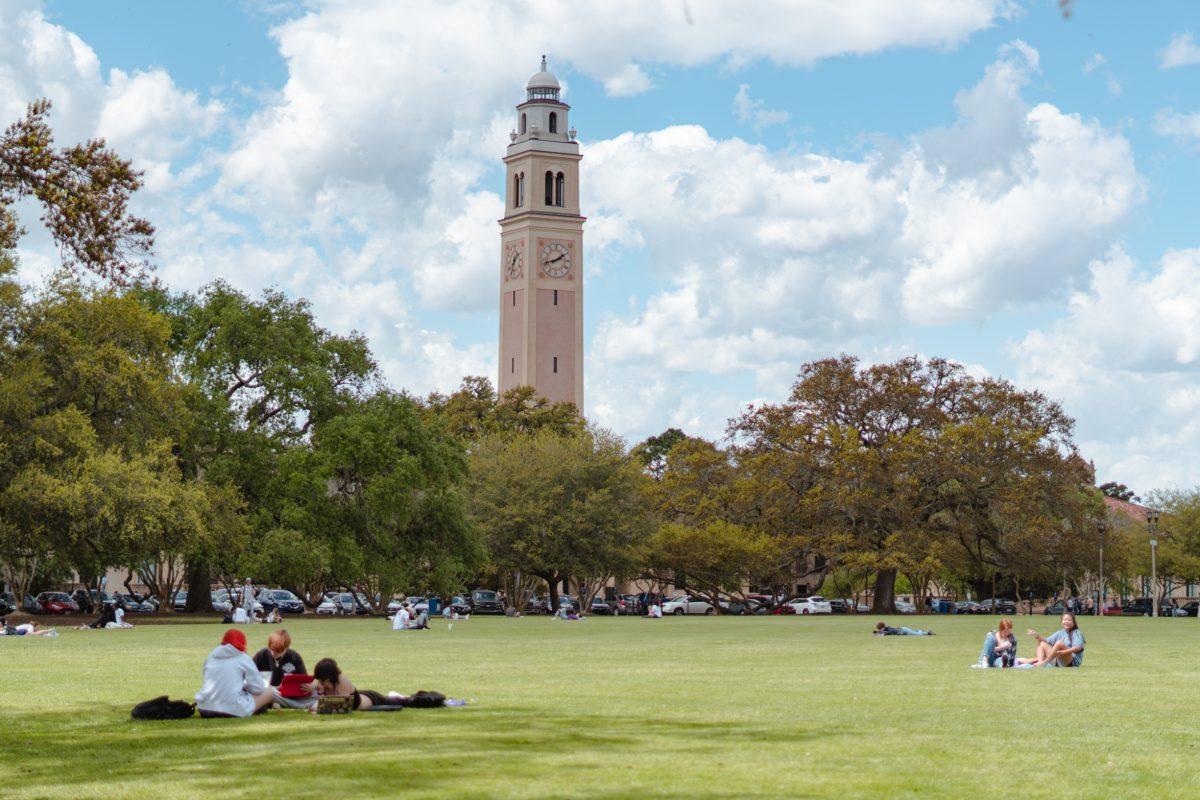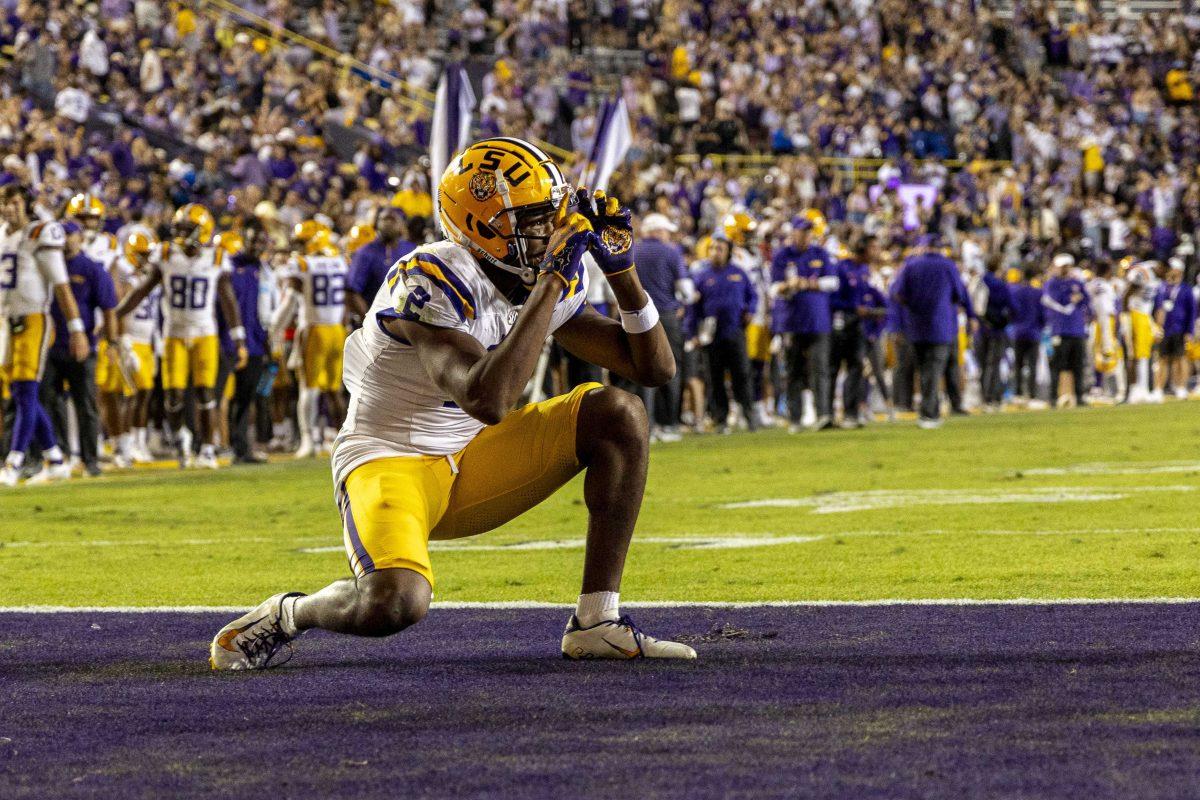For LSU students who voted for President-elect Donald Trump, the results of the 2024 election came as a hopeful confirmation, despite any reservations about his character or regardless of the misgivings of others.
For Vice President Kamala Harris’ voters, the results were a sore, if unsurprising, turn of events spurred by a confused and ineffective Democratic Party.
Months of polling showed the presidential election would be a close call between Harris and Trump. The results of the election painted a very different picture.
Trump won all seven swing states, clinching the presidency by a comfortable margin and shifting voters from almost all demographics to the right. Harris was left in the dust.
“I thought it was going to be closer,” said political science senior Cody Middlebrooks, from Bunkie, Louisiana.
“I voted for Donald Trump, so I’m happy with it,” said finance senior Blaze Restivo from Denham Springs.
“I shouldn’t be surprised,” said psychology sophomore Stella Powell from North Louisiana. “I don’t know how to feel about it.”
Sitting in the E. J. Ourso College of Business, Middlebrooks pulled at the edges of his beard, as he considered the results. He described himself as a moderate who leaned to the right. And because he couldn’t square his political beliefs with either candidate this year, Middlebrooks said he decided not to vote.
He said he felt the right had gone too far in recent years. On issues like illegal immigration, he agreed there was a problem, “but I don’t believe going around and deporting millions of people is the right thing,” he said.
Middlebrooks thought the issue of abortion shouldn’t have been thrown to the states, but at this point, there was little those whom believe in choice could do to return to the pre-Dobbs era.
“With the economy being as bad as it is, it’s very hard to run off of issues that we can agree are important,” Middlebrooks said, “like transgender rights, abortion rights, when people are so worried about: How are they going to pay their bills? How are they going to make ends meet?”
Harris wasn’t a candidate that he could gladly support, he said. Maybe if there’d been a Democratic primary, or if Joe Biden had left the race sooner, that could have been different, but with a last-minute shift and the weight of Biden’s presidency dragging her down, Harris couldn’t swim.
Blaze Restivo said he voted for Trump because he believed he’d be better for business and immigration — and because Trump’s policies seemed to align with his Christian values.
“The Democrats are pro abortion. I think that that’s bad,” Restivo said. “Also the transgender stuff. I don’t think people should change their bodies. That’s how God created them.”
On the other hand, students like Stella Powell saw Trump’s win as a worrying indication of the nation’s attitude toward the LGBTQ+ community.
“It’s going to become dangerous for queer people,” Powell said. “It’s a little scary, especially because I have some LGBTQ friends.”
Construction management junior Evan Williams said he was surprised when he learned Trump, who he voted for, had won the election. Williams said he was hopeful but not excited about the next four years of his presidency.
“I’m not saying I completely like who he is, but for my beliefs it’s what happened,” Williams said, referencing his vote.
Psychology freshman Jai Cooper said she was unhappy with the results, especially given that the Republican Party had won a majority in the United States Senate and seemed to be closing in on one the House of Representatives as well.
Originally from Florida, Cooper said she didn’t vote because it had been too difficult to mail in an absentee ballot.
Cooper said she wasn’t surprised by the vice president’s loss. Biden’s presidency, she said, had “hurt” the Democratic Party.
Engineering freshman Claire Guidrose from New Orleans said she was surprised by the results, pointing to the echo chamber of social media.
“If you like one post about something on a website, it’ll be like, oh, this is your political affiliation and only show you that stuff.”
Guidrose said because of the posts she’d been seeing on social media, she thought Harris would win most of the swing states.
Guidrose also said she thought much of the media discourse about Trump’s second presidency had been overdramatized.
“I don’t think it’s going to be as bad as people think it’s going to be,” she said.
Communication disorders freshman Joseph Mensman, from Baton Rouge, agreed.
“I don’t like him,” Mensman said of Trump. “But I’m not going to call him a fascist.”
Mensman said he voted for Harris because he believes she would do more to protect the environment.
“The biggest thing, for me, is climate change and making sure that we don’t mess up the whole planet by the time I’m old,” Mensman said, mentioning Trump’s withdrawal from the Paris Climate Accord in 2017.
Middlebrooks said he was already thinking about what would happen after Trump’s second term.
Would a figure like J.D. Vance be able to take up the President-elect’s mantle? Or maybe the Democratic Party could be more successful without an unpopular incumbent?
“The fact that it went this way so much means it’s going to have to swing back the other way again,” Middlebrooks said.







